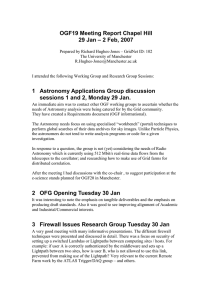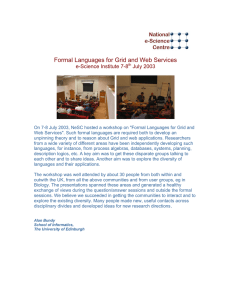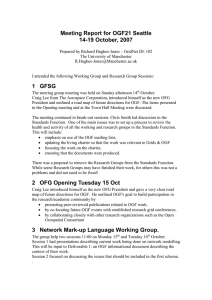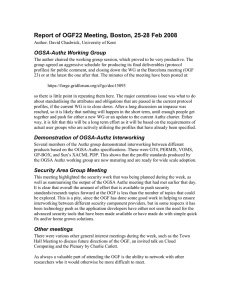OGF19 - Raleigh
advertisement
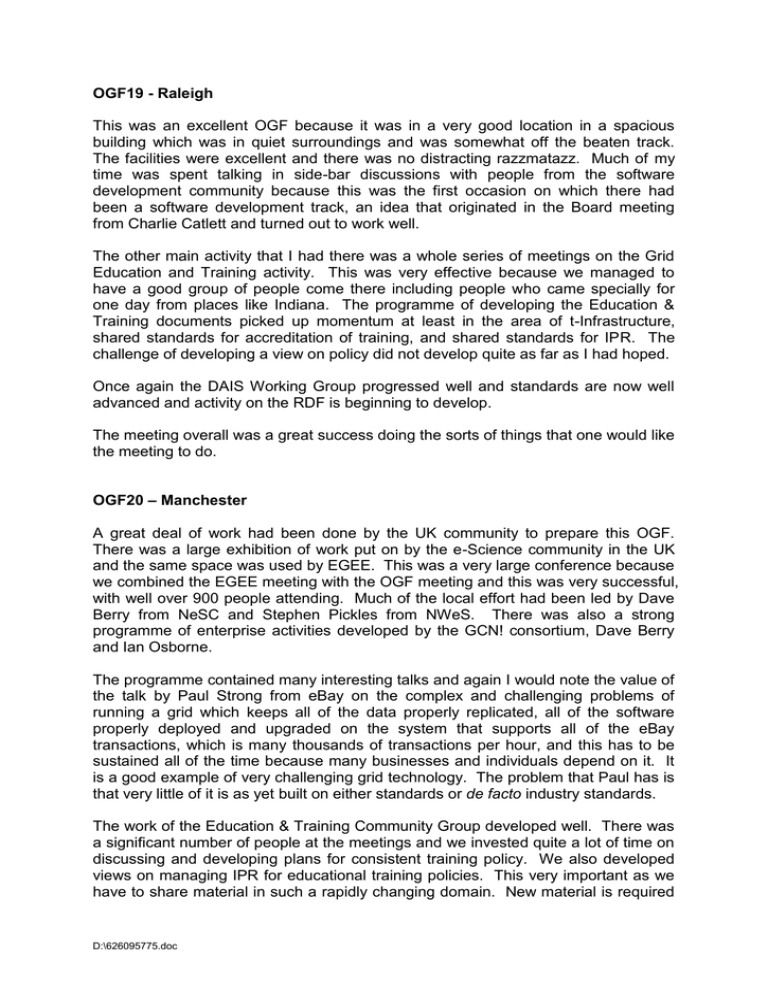
OGF19 - Raleigh This was an excellent OGF because it was in a very good location in a spacious building which was in quiet surroundings and was somewhat off the beaten track. The facilities were excellent and there was no distracting razzmatazz. Much of my time was spent talking in side-bar discussions with people from the software development community because this was the first occasion on which there had been a software development track, an idea that originated in the Board meeting from Charlie Catlett and turned out to work well. The other main activity that I had there was a whole series of meetings on the Grid Education and Training activity. This was very effective because we managed to have a good group of people come there including people who came specially for one day from places like Indiana. The programme of developing the Education & Training documents picked up momentum at least in the area of t-Infrastructure, shared standards for accreditation of training, and shared standards for IPR. The challenge of developing a view on policy did not develop quite as far as I had hoped. Once again the DAIS Working Group progressed well and standards are now well advanced and activity on the RDF is beginning to develop. The meeting overall was a great success doing the sorts of things that one would like the meeting to do. OGF20 – Manchester A great deal of work had been done by the UK community to prepare this OGF. There was a large exhibition of work put on by the e-Science community in the UK and the same space was used by EGEE. This was a very large conference because we combined the EGEE meeting with the OGF meeting and this was very successful, with well over 900 people attending. Much of the local effort had been led by Dave Berry from NeSC and Stephen Pickles from NWeS. There was also a strong programme of enterprise activities developed by the GCN! consortium, Dave Berry and Ian Osborne. The programme contained many interesting talks and again I would note the value of the talk by Paul Strong from eBay on the complex and challenging problems of running a grid which keeps all of the data properly replicated, all of the software properly deployed and upgraded on the system that supports all of the eBay transactions, which is many thousands of transactions per hour, and this has to be sustained all of the time because many businesses and individuals depend on it. It is a good example of very challenging grid technology. The problem that Paul has is that very little of it is as yet built on either standards or de facto industry standards. The work of the Education & Training Community Group developed well. There was a significant number of people at the meetings and we invested quite a lot of time on discussing and developing plans for consistent training policy. We also developed views on managing IPR for educational training policies. This very important as we have to share material in such a rapidly changing domain. New material is required D:\626095775.doc often but in particular an exercise with example data and example software is very labour-intensive to build and it really is worth sharing it between institutions but the institutional ownership issues have to be understood by the academics who prepared the material. We talked at some length about cooperation on the provision of t-Infrastructure, the sustained infrastructure to support training or education, and again, there are big advantages for sharing, not least coping with the very peaky load of training sessions, but again one needs policies which allow that sharing to be fair. We progressed the ideas on the professional grid qualifications. The work in the DAIS Working Group progressed again, particularly in the RDF area. The work on OGSA naming finally produced a result and it was nice to see this. There was some resolution of the relationships with grid file systems as well and there were good demonstrations of that work by the team led by Andrew Grimshaw. Overall there was good progress on reference models and detailed definitions that support interoperability and sharing and management of computational systems but still there seems to be too little work on the management, sharing, distribution and replication and so on of the large volumes of data for which I think grids are very significant, and there was virtually no work on how you get connections to legacy data repositories. The one community where there is some interesting collaboration going on at the moment in this area is the Open Geospatial Consortium interacting with OGF and that is now a significant development, again some of this is led by people in Edinburgh, from EDINA. OGF21 – Seattle This is an OGF which I attended as briefly as possible, trying to minimise jetlag and because of UK commitments. It was good to meet a number of former UK e-Science community members and to note that they were giving maximum benefit of their experience and the UK investment in e-Science to a company which likes to extract as much money from us as possible. I wonder what we can do to try and encourage better use of our advanced knowledge and skills within the UK. My primary reason for being at this OGF apart from attending formal meetings, Board meetings and so on, was to push forward the Education & Training Community Group activities. The overall discussion of policy and grid education still tends to involve many issues on terminology but overall there is consensus that investment is necessary, that sharing is necessary, that sharing ideas on curricula is necessary, and there was a endorsement towards the development of common practical material. The framework for professional grid certification proved quite challenging. The proposers of the current form of the document from Germany have a very strong view that this should be modelled on the sort of professional certification that is undertaken by Cisco and Microsoft or the Linux community for authorisation of people to work on their technology. However, the grid is much broader and wider than that and so one would look for a more flexible and more general process. Their view was that the OGF could take on that role. That is not possible because the OGF does not have the academic credentials or the legal framework and certainly most countries expect to have that kind of accreditation achieved via the professional bodies or accreditation bodies within their countries, endorsed by their Education Ministry. So, to find an international model is still something of a challenge. The discussions on managing IPR for educational repositories are not progressing as fast as one would have liked, mainly because no one from the USA (a major potential contributor), or from Asia, is coming forward and being prepared to put forward their views on how they would manage IPR. The proposal to build on the Creative Commons is a good one but the difficulty is that IPR legislation and standard practices differ greatly in different countries and, in many cases, the academics who are creating the IPR are not fully aware of their employer’s attitude to sharing it in a common repository, i.e. they are apt to sign (tick) releases when they do not have the authority to do so – a notion of informed consent is needed. Implementation of policies for cooperating on t-Infrastructure is another topic which is progressing well but maybe not as fast as one would like. The difficulty here is not so much interoperation as cohabitation. The problem is to get the various models of grid software and the example applications that are used for education to be able to run in the same context so that lecturers and other educators do not have to build or access multiple contexts in order to demonstrate the multiple concepts in this domain. The work continues with most of the effort of writing being undertaken by the team from Catania. The conference showed two very strong successes on interoperation which I think is a sign of the improvement and maturing of OGF. The OGSA ByteIO interoperability first demonstrated two independent implementations of ByteIO based on the proposed standard and this of course is the requirement to take a proposed standard recommendation to a full standard. That work was led by people at EPCC in Edinburgh and it is very good seeing it coming to a success. The other interoperability success which was quite spectacular was the work on the high performance computing profile. that has been developed in a very short time and has built on the JSDL standard which was developed and proposed by the UK led by people from Imperial College London. It is good to see this progress. Overall, it was a successful if somewhat brief, for me, meeting in Seattle.
